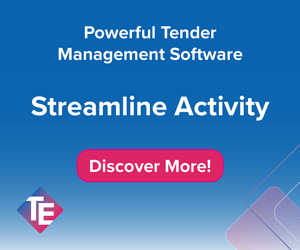A teacher stands authoritatively at the front of a classroom, but only some students are paying attention. A few are chatting, some are passing notes, and several students are gazing out the window, lost in thought. Even among the students with eyes on the board, some have blank looks, not understanding the lesson.
It doesn’t matter where you went to school– this is likely a classroom scene you’ve seen before. Teaching is not just about authority and reciting material. A good teacher also engages students and provides structure and support for success.
Likewise, your role as a Proposal Manager is to engage and motivate team members with their different prior knowledge and experiences to ensure ultimate success.
These are ten lessons I took from my time teaching, which inform my work as a Proposal Manager daily:
1. Begin with the goal in mind
Teaching success begins with identifying the goal for the school year, whether subject mastery or passing a high-stakes test and then making decisions every day to align with the ultimate objective. Proposal goals range from increasing win probability to being innovative to submitting a compliant, winning proposal. Whatever the ultimate goal, it is useful to use it to create a framework for the innumerable decisions you will make as the proposal manager along the way to support your team best.
2. Be directive and set expectations
One of the first things you learn as a teacher is that students have a much higher chance of being successful if they know what they should be doing, not just prohibitions. Best practice for class rules is to say, “Raise your hand” (instead of “Don’t interrupt”) or “Use appropriate language” (instead of “No profanity”). The same applies to proposal management. If you are looking for a team member to share details on a call or have a deliverable ready by a deadline, be as explicit as possible about the expectations to ensure the desired outcome.
3. Build relationships
Think back to your own teachers. Odds are, the ones who you would classify as “best” are those who took the time to interact with you personally while teaching the subject of the class. Proposal management similarly involves leading a team of people, which can be best accomplished by building relationships based on trust and understanding. There will inevitably be tough moments, tight timelines, and pivots – and having the basis of a personal relationship with team members will help you to address challenges that arise.
4. Ask questions to understand
It’s easy to be reactive as a teacher, but it does not accomplish much to repeatedly chastise a student for lying on the desk. Instead, it is far more productive to ask why their head is down. Understanding whether it was a bad night’s sleep or forgetting to eat breakfast, you are far better positioned to address the situation knowing the cause. As a proposal manager, this most often arises when a deadline has been missed. While I could instantly escalate the situation by sending urgent e-mails, leaning on my teaching experience, I have found it far more useful to ask questions to check on a status or identify what is causing a delay so that I can identify a path forward.
5. Provide support and resources for others to be successful
As a teacher, you are most often measured not by your own actions but the achievements of your students. Proposal management, while a craft that entails a lot of expertise, is most typically measured by the outcome: a win percentage. In both cases, as a facilitator of the process, you are positioned to provide support along the way. Whatever the goal (see #1 above), approach your role as a proposal manager as linking team members to the resources they need to address challenges and be successful.
6. Use the time allotted
As a teacher, one of the most unforgiving sounds was that of the bell at the end of class. Whether you were only partway through your lesson or had finished, students move to their next class. While timing is not quite as extreme in the professional world, time is of the essence, especially when faced with a quick-turn proposal. Timing is also critical for kickoff and review meetings you facilitate to ensure you are maximizing participants’ limited time. Manage your proposals with the timeline and milestones in mind.
7. Be Flexible
In proposal management, there is a huge emphasis on the importance of milestones. While deadlines are, of course, crucially important, so is flexibility. As a teacher, you can’t be successful if you postpone every test, but once in a while, it may be warranted. The occasional flexibility with proposal timing can be the little shift that leads to the difference between being just good and being fundable. And if you’re savvy on all but the most truncated timelines, you have already built in buffer time to provide flexibility in service of your ultimate goal: putting forth the strongest possible proposal.
8. Add value through your role
As a teacher, it’s not your role to do students’ homework or take a test for them, so what do you do exactly? The critical question of what value you add (through facilitating learning) is what may motivate an unengaged student to pay attention once they realize how you can help them. It is no different with proposal management. While you likely can’t write a proposal for your technical team, figure out where gaps in the process might lie, and use your role to add value and increase the win probability of the proposals you manage.
9. Reflect
As a teacher (and as a proposal manager), a lot of success comes after trial and error – and you definitely will not get everything right on your first try. And sometimes, you won’t even realize exactly what led to your success. Which is why it is important to reflect. Not only through a formal debrief process but also by setting aside some time to think through the experience and perhaps engage with others to reflect on successes and challenges.
10. Continuously Improve
Of course, just reflecting and thinking about your performance is not enough – not as a teacher and certainly not as a proposal manager. The ultimate purpose of reflection is to lead to continuous improvement. Not only as a novice but after each instance of managing a capture or proposal, so you can continue to refine your craft and get better each time.
About the Author
Lana Cohen is a Senior Proposal and Capture Manager at RTI International based in Raleigh, NC, and was formerly a mathematics teacher at a high-needs high school in Washington, DC. She is a member of the APMP Carolinas Chapter and holds degrees in neuroscience and education. Connect with Lana on LinkedIn.



Join the Conversation